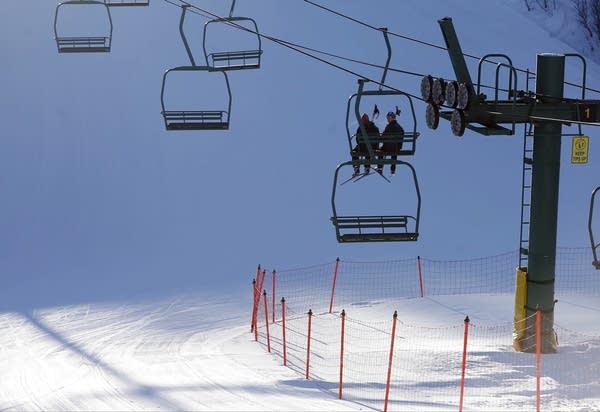Audit calls out Iron Range board on losses, loans, governance

Go Deeper.
Create an account or log in to save stories.
Like this?
Thanks for liking this story! We have added it to a list of your favorite stories.
Updated: 4 p.m. | Posted: 9:41 a.m.
The state agency charged with boosting Minnesota's Iron Range economy has spent millions subsidizing losses at its Giants Ridge resort and has fallen short overseeing the loans it makes.
Those are the key findings of a report released Friday by Minnesota's Office of Legislative Auditor, which also questioned the legal standing of the agency, the Iron Range Resources and Rehabilitation Board.
Turn Up Your Support
MPR News helps you turn down the noise and build shared understanding. Turn up your support for this public resource and keep trusted journalism accessible to all.
Based in Eveleth, the IRRRB doles out tens of millions of dollars every year in grants and loans intended to spur economic development in northeastern Minnesota.
The audit, however, called out the agency on its loan decision-making, its governance and the losses at Giants Ridge Recreation Area, the IRRRB's Biwabik, Minn., resort featuring golf courses, biking, skiing and snowboarding.
Among its findings, the report said the agency didn't do enough to detail objectives, such as job growth, when it made loans and then came up short on assessing if goals were met.
Of 15 loans the agency made in the past five years that the auditor's office analyzed, seven failed to meet job creation goals and with most of the others it's too early too tell, Jody Hauer with the auditor's office told a state legislative hearing Friday.
"Just two of those 15 companies that we reviewed have loans that showed job growth aligned with what they had forecast," Hauer told lawmakers.
The report also faulted the IRRRB for "inaccurate and outdated" information on its loan database with files that "contained only vague estimates of job growth and had little evidence of achieving objectives."

Hauer said she found that in 2014, 20 percent of companies did not report job data and the IRRRB failed to verify data that companies did provide.
The legislative auditor also detailed the financial drain of Giants Ridge.
From 2006 to 2014, Giants Ridge operating losses increased by more than 500 percent. In that time, the IRRRB spent $17.4 million to cover the resort's operating losses, auditors wrote.
"We think that the IRRRB should analyze Giants Ridge in light of that growing operating loss to make a decision about whether Giants Ridge remains consistent with the agency's overall mission," Hauer said.
The IRRRB is unique in state government. It's funded by a tax on the production of taconite, which iron mining companies pay in lieu of local property taxes.
While it's in the state's executive branch, its board is made up of state legislators, all but one from the Iron Range, who hold "significant control" over the agency, said Legislative Auditor Jim Nobles.
Some Iron Range legislators argue their role is largely advisory, since the governor has final say over many of its decisions. But the Iron Range delegation also said they take seriously the concerns laid out in the report.
The question of the IRRRB's governance structure has hung over the agency for decades, Nobles added. His report noted that the statutes underpinning the IRRRB's basic governance structure "are vulnerable to a constitutional challenge."
The report recommends several possible changes, including operating the IRRRB with just a commissioner and not a board, or having the governor appoint board members.
In his written response, IRRRB Commissioner Mark Phillips said his agency would work to get more and better information on job creation tied to loans and that a loan database upgrade was already underway.
On Giants Ridge, he said there will likely be "changes to the management and operations."
At the legislative hearing, Phillips also highlighted an IRRRB success story. He pointed to subsidies the agency gave to companies such as Delta Air Lines and Blue Cross and Blue Shield of Minnesota, which employ 1,200 people at customer service centers on the Iron Range.
"None of these companies needed the agency's money to locate here or expand here, but none of them would have if the agency had not participated in creative financing that met their needs," he said. "In the face of the worst mining downturn since 2008, it's hard to imagine what the Iron Range would look like without these critical employers."
Correction (March 21, 2016): Jody Hauer's name was misspelled in an earlier version of this story. It has been corrected.




